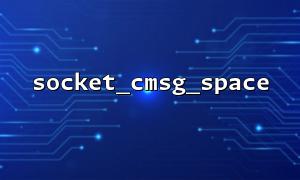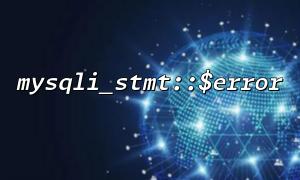In PHP, when sending messages using socket_sendmsg , more message control information (such as file descriptors, etc.) may be required. To avoid buffer overflow when sending messages, PHP provides the socket_cmsg_space function, which can calculate the space size suitable for passing control information. This article will discuss several issues that need to be paid attention to when using these two functions.
The socket_sendmsg function allows the user to add additional control information when sending messages. These control information are passed through "control messages", which can contain information that is independent of the data itself, such as sending file descriptors, additional data, etc.
For example, in an application, the client sends data through socket_sendmsg and also wishes to accompany a file descriptor so that the server can access the file. socket_sendmsg needs to correctly set the message structure, and control information is transmitted through cmsg data.
$socket = socket_create(AF_INET, SOCK_STREAM, SOL_TCP);
socket_connect($socket, "gitbox.net", 8080);
$msg = "Hello World";
$controlData = socket_cmsg_space($socket, SOL_SOCKET, SCM_RIGHTS, strlen($msg));
// Then use socket_sendmsg Send data and control information
The socket_cmsg_space function returns the buffer space size that can accommodate specified control information. It helps us reserve enough space to deliver control messages when sending data using socket_sendmsg . This function is especially useful because the size of the control message may vary by platform.
$space = socket_cmsg_space($socket, SOL_SOCKET, SCM_RIGHTS, strlen($msg));
The $space return value here represents the available space when passed to socket_sendmsg on the current socket, in bytes.
Control information is passed through a special structure in socket_sendmsg . This structure needs to calculate the appropriate space through socket_cmsg_space before sending.
When sending control information using socket_sendmsg , these control messages must be constructed strictly in the predetermined format. For example, when sending file descriptors, we need to use SCM_RIGHTS as the control message type.
$control = pack("i", $fd); // File descriptors need to be packaged in binary format
$buf = socket_sendmsg($socket, $msg, $control, $space);
When using socket_cmsg_space to calculate space, you must ensure that there is enough space reserved for control information. If there is insufficient space, socket_sendmsg may fail, or the sent information may be truncated, resulting in incomplete messages.
Generally speaking, when sending data, use the socket_cmsg_space function to calculate the required space, and when calling socket_sendmsg , make sure that the buffer has been fully allocated.
$spaceNeeded = socket_cmsg_space($socket, SOL_SOCKET, SCM_RIGHTS, strlen($msg));
if ($spaceNeeded < strlen($control)) {
// Dealing with insufficient space
}
In practical applications, some common errors and exceptions must be noticed, especially when sending messages using socket_sendmsg :
Buffer overflow : If the spatial calculation of the control information is inaccurate, it may cause buffer overflow.
Message truncation : The inaccurate calculation of the size of the control information may result in incomplete message transmission.
Platform differences : Different platforms may have different processing of the size of control information. Using socket_cmsg_space can ensure cross-platform compatibility.
When sending control information using socket_sendmsg , be sure to calculate the required space based on the data size, and use socket_cmsg_space function to ensure that sufficient buffers are reserved.
Ensure that the control information is of the correct format and type and is compatible with the target system.
Error handling and exception conditions are very important to ensure that you are fully prepared for sending failures or buffer overflows.
By using socket_cmsg_space and socket_sendmsg correctly, you can transfer data and control information more efficiently and safely.















